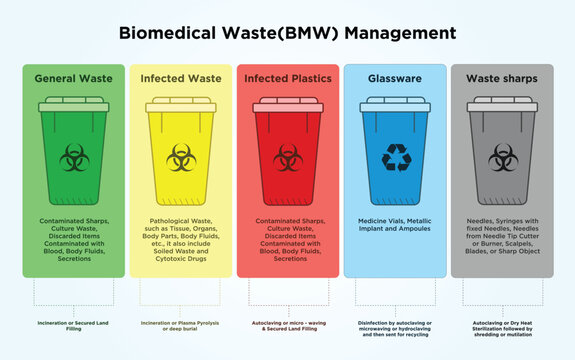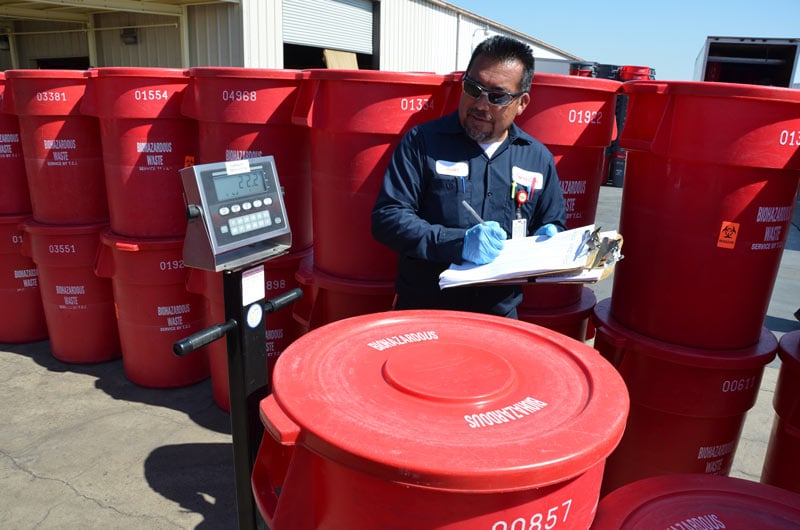Complete Medical Waste Removal Service: Smooth Disposal for Medical Care Facilities
Wiki Article
The Relevance of Appropriately Handling Medical Waste
Correct management of clinical waste is of utmost significance in health care centers. The handling, storage, and disposal of medical waste need rigorous adherence to guidelines and guidelines to make sure the security of patients, medical care workers, and the environment. Incorrect administration of clinical waste can position major wellness dangers, consisting of the transmission of transmittable illness and injuries from sharp items. Improperly disposed of clinical waste can have detrimental effects on the environment, infecting water resources and dirt. Health care facilities have regulatory and legal obligations to correctly handle clinical waste, and failing to conform can cause penalties and lawful consequences. By implementing finest methods for risk-free handling and disposal of medical waste, health care experts can reduce these risks and add to a safer and much healthier atmosphere for all. Ample education and learning and training on waste administration are vital for health care specialists to satisfy their obligations around.Health And Wellness Dangers Connected With Improper Waste Monitoring
Incorrect monitoring of clinical waste positions significant health and wellness dangers to both health care workers and the general public - WasteX Medical Waste Disposal. Clinical waste, which consists of sharps, contagious products, pharmaceuticals, and radioactive materials, requires proper handling and disposal to stop the spread of infections, injuries, and exposure to damaging materials
Among the main wellness threats connected with inappropriate clinical waste monitoring is the transmission of infectious conditions. Medical care employees that come right into call with polluted waste may get conditions such as HIV, liver disease, or other bloodborne microorganisms. Similarly, if clinical waste is not properly thrown away, it can infect the atmosphere, water sources, and also food, resulting in the spread of diseases within the community.
Improper waste monitoring can additionally cause injuries, specifically from sharps such as needles, scalpels, and damaged glass. Unintentional needle punctures can result in the transmission of bloodborne conditions, while cuts from sharp items can cause severe injuries and infections.
In addition, the improper disposal of pharmaceutical waste can cause the contamination of water products. When expired or extra medications are flushed down the bathroom or thrown out wrongly, the chemicals can seep right into water sources, impacting aquatic life and potentially entering the human food chain.
Environmental Influence of Poorly Disposed Medical Waste
One of the considerable consequences of inadequate administration of medical waste is its damaging effect on the setting. Incorrectly disposed medical waste presents a severe hazard to environments, water bodies, and the total equilibrium of the environment. WasteX Medical Waste Disposal. The harmful materials contained in medical waste, such as transmittable agents, pharmaceuticals, and chemicals, can pollute dirt, air, and water, resulting in widespread air pollution and degradationWhen clinical waste is not appropriately set apart, treated, and disposed of, it can find its means into water bodies via improper garbage dump methods or prohibited dumping. This can lead to the contamination of groundwater and surface area water, influencing aquatic life and possibly polluting drinking water sources. The launch of hazardous chemicals and drugs right into the atmosphere can disrupt ecosystems and injury both animal and plant varieties.
Furthermore, improper incineration of clinical waste can launch toxic toxins, including dioxins and furans, right into the environment. These toxins have actually been connected to various wellness problems, including respiratory system issues, reproductive problems, and also cancer cells. The release of greenhouse gases throughout incineration likewise adds to climate change.
To reduce the environmental influence of incorrectly disposed medical waste, it is essential to carry out correct waste management methods. This consists of partition of waste at the source, ideal therapy approaches, and risk-free disposal methods. By doing so, we can decrease the air pollution and secure the atmosphere from the harmful effects of clinical waste mismanagement.
Legal and Governing Commitments for Healthcare Facilities
In order to deal with the ecological influence of incorrectly disposed clinical waste, health care centers are called for to adhere to governing and legal responsibilities. These responsibilities are established to ensure the correct handling, storage, transportation, and disposal of medical waste in a risk-free and ecologically responsible manner.Among the key lawful commitments for medical care facilities is to acquire the required permits and licenses for handling medical waste. This includes acquiring a waste generator recognition number and following federal, state, and local policies. Medical care facilities must additionally maintain in-depth documents of the types and quantities of medical waste generated, as well as the techniques made use of for its disposal.
Furthermore, healthcare centers need to apply proper partition and packaging treatments for various kinds of clinical waste, such as sharps, transmittable waste, and pharmaceutical waste - medical waste removal. This includes utilizing leak-proof containers, biohazard bags, and sharps containers that satisfy regulative see here criteria
Healthcare facilities are also in charge of making certain that their personnel get appropriate training on the correct handling and disposal of medical waste. This includes training on infection control, personal protective equipment, and waste administration protocols.
Finest Practices for Safe Handling and Disposal of Medical Waste
To ensure the risk-free handling and disposal of medical waste, healthcare facilities ought to implement finest practices. These practices are important to safeguard the health and wellness of both medical care employees and the basic public. The appropriate management of medical waste is crucial in protecting against the spread of infectious diseases and reducing environmental contamination.One of the very best practices for secure handling and disposal of medical waste is partition. Health care centers should separate different kinds of clinical waste, such as sharps, infectious materials, and pharmaceutical waste, to stop cross-contamination. Correct labeling and color coding of waste containers also play a vital duty in making certain the right segregation of clinical waste.
One more important finest technique is the usage of appropriate containers for saving and moving medical waste. These containers should be leak-proof, puncture-resistant, and properly secured to stop any type of possible release of hazardous materials. In addition, medical care facilities need to develop clear methods for the collection, storage space, and transport of medical waste to reduce the danger of direct exposure and contamination.
Additionally, health care facilities must educate their staff on the proper handling and disposal of clinical waste. Routine training sessions and correspondence course ought to be carried out to keep health care employees upgraded on the most recent guidelines and laws. This will certainly help make sure that every person involved in the process knows the possible threats and is geared up with the needed knowledge and skills to take care of medical waste securely.
Education And Learning and Training for Medical Care Professionals in Waste Monitoring
Healthcare specialists need extensive education and learning and training in waste management to make sure the appropriate handling and disposal of clinical waste. The monitoring of medical waste is an important part of medical care operations as it directly impacts the health and wellness of both medical care workers and the public. Correct education and training gear up health care professionals with the needed understanding and skills to get rid of and manage of medical waste in a environmentally liable and secure fashion.Education and learning and training programs for health care specialists in waste management cover a series of topics, including the classification and partition of clinical waste, correct packaging and storage, labeling and transport needs, and using personal safety devices. These programs also emphasize the importance of adherence to local, national, and worldwide guidelines and standards regulating medical waste administration.
By obtaining comprehensive education and training in waste monitoring, healthcare professionals can successfully lessen the risks connected with medical waste, such as the transmission of infectious illness and the potential harm to the setting. WasteX Medical Waste Disposal. Well-trained experts can determine and apply ideal methods that promote sustainability and reliable waste monitoring techniques within medical care centers.
Continual education and training in waste monitoring need to be a continuous priority for health care professionals, as waste monitoring techniques and guidelines might advance over time. By remaining updated with the most up to date advancements in waste monitoring, health care specialists can make certain that they are furnished with the understanding and skills necessary to make enlightened decisions and add to the overall renovation of waste management practices in health care setups.

Verdict
In final thought, appropriate monitoring of clinical waste is critical to mitigate health risks and reduce the environmental impact. Healthcare facilities have governing and lawful commitments to ensure safe handling and disposal of medical waste.
Healthcare professionals need detailed education and learning and training in waste management to guarantee the appropriate handling and disposal of clinical waste - medical waste disposal service. The administration of clinical waste is a crucial part of health care procedures as it straight impacts the health and security of both healthcare employees and the general public
Report this wiki page